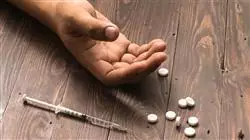University certificate
The world's largest faculty of medicine”
Introduction to the Program
Addictions are a public health problem and physicians are obliged to know how to intervene optimally. If you also want to learn about this field of work, then this Professional master’s degree is for you"

In recent years, the UN has increased its estimate of deaths related to drug use worldwide to an estimated 585,000 in 2017, up from the 450,000 deaths it estimated occurred in 2015.
Among the most lethal drugs are opioids, which are behind two-thirds of recorded deaths. In the EEUU alone, overdose deaths in 2017 totaled 47,000. The UN estimates that some 42 million years of "healthy" life were lost due to premature deaths and years lived with some disability due to drug use.
In recent decades, those addictions where there’s no substance that produces dependence, but rather a habit or behavior have also been added to the list of addictions which require treatment. This is the case of pathological gambling and addiction to new technologies, which are causing serious psychological and social health problems in both adults and young people. For these cases, medicine has also developed treatments that seek to reduce and eliminate the habits and behaviors. Aware of this reality, the teaching team of this Professional master’s degree in Cognitive-Behavioral Treatment of Addictions has made a careful selection of each of the topics in this program.
As it is a Professional master’s degree completely online, students are not bound by fixed schedules or the need to move to another physical location, rather, they can access the content at any time of the day, balancing their professional or personal life with their academic life.
Likewise, the physician will have access to a series of unique and complementary Masterclasses, given by an internationally renowned eminent professor. With his in-depth knowledge and vast background in the field of Behavioral Neuroscience, he will effectively guide graduates, enabling them to acquire the essential skills to keep abreast of the latest innovations in the Cognitive-Behavioral Treatment of Addictions.
You will broaden your knowledge of Cognitive-Behavioral Addiction Treatment through Masterclasses led by an international specialist in Behavioral Neuroscience"
This Professional master’s degree in Cognitive-Behavioral Treatment of Addictions contains the most complete and up-to-date scientific program on the market. The most important features include:
- Development of clinical cases presented by professional experts
- The graphic, schematic, and practical contents with which they are created provide scientific and practical information on the disciplines that are essential for professional practice
- New diagnostic and therapeutic developments in the assessment, diagnosis and intervention of the biological and neurological processes that explain mental illness
- It contains practical exercises where the self-assessment process can be carried out to improve learning
- An algorithm-based interactive learning system for decision-making in the clinical situations presented throughout the course
- With special emphasis on evidence-based medicine and research methodologies
- All of this will be complemented by theoretical lessons, questions to the expert, debate forums on controversial topics, and individual reflection assignments
- Content that is accessible from any fixed or portable device with an Internet connection
Smoking, drug addiction or alcoholism are just some of the addictions that will be studied in this Professional master’s degree, paying special attention to the most effective treatment for these pathologies"
The program includes in its teaching staff, professionals belonging to the field of medicine, who bring to this training their work experience, as well as recognized specialists belonging to leading scientific societies of reference.
Thanks to its multimedia content developed with the latest educational technology, they will allow the professional a situated and contextual learning, that is to say, a simulated environment that will provide an immersive learning programmed to prepare for real situations.
This program is designed around Problem-Based Learning, whereby the professional must try to solve the different professional practice situations that arise during the course. For this purpose, the students will be assisted by an innovative interactive video system created by renowned and experienced experts.
The latest developments in the world of medical treatment of addictions compiled in an online program, 100% practical and eminently professionalizing"

Increase your confidence in decision-making by updating your knowledge through this Professional master’s degree in Cognitive-Behavioral Treatment of Addictions and improve the care of your patients"
Why study at TECH?
TECH is the world’s largest online university. With an impressive catalog of more than 14,000 university programs available in 11 languages, it is positioned as a leader in employability, with a 99% job placement rate. In addition, it relies on an enormous faculty of more than 6,000 professors of the highest international renown.

Study at the world's largest online university and guarantee your professional success. The future starts at TECH”
The world’s best online university according to FORBES
The prestigious Forbes magazine, specialized in business and finance, has highlighted TECH as “the world's best online university” This is what they have recently stated in an article in their digital edition in which they echo the success story of this institution, “thanks to the academic offer it provides, the selection of its teaching staff, and an innovative learning method aimed at educating the professionals of the future”
A revolutionary study method, a cutting-edge faculty and a practical focus: the key to TECH's success.
The most complete study plans on the university scene
TECH offers the most complete study plans on the university scene, with syllabuses that cover fundamental concepts and, at the same time, the main scientific advances in their specific scientific areas. In addition, these programs are continuously being updated to guarantee students the academic vanguard and the most in-demand professional skills. In this way, the university's qualifications provide its graduates with a significant advantage to propel their careers to success.
TECH offers the most comprehensive and intensive study plans on the current university scene.
A world-class teaching staff
TECH's teaching staff is made up of more than 6,000 professors with the highest international recognition. Professors, researchers and top executives of multinational companies, including Isaiah Covington, performance coach of the Boston Celtics; Magda Romanska, principal investigator at Harvard MetaLAB; Ignacio Wistumba, chairman of the department of translational molecular pathology at MD Anderson Cancer Center; and D.W. Pine, creative director of TIME magazine, among others.
Internationally renowned experts, specialized in different branches of Health, Technology, Communication and Business, form part of the TECH faculty.
A unique learning method
TECH is the first university to use Relearning in all its programs. It is the best online learning methodology, accredited with international teaching quality certifications, provided by prestigious educational agencies. In addition, this disruptive educational model is complemented with the “Case Method”, thereby setting up a unique online teaching strategy. Innovative teaching resources are also implemented, including detailed videos, infographics and interactive summaries.
TECH combines Relearning and the Case Method in all its university programs to guarantee excellent theoretical and practical learning, studying whenever and wherever you want.
The world's largest online university
TECH is the world’s largest online university. We are the largest educational institution, with the best and widest online educational catalog, one hundred percent online and covering the vast majority of areas of knowledge. We offer a large selection of our own degrees and accredited online undergraduate and postgraduate degrees. In total, more than 14,000 university degrees, in eleven different languages, make us the largest educational largest in the world.
TECH has the world's most extensive catalog of academic and official programs, available in more than 11 languages.
Google Premier Partner
The American technology giant has awarded TECH the Google Google Premier Partner badge. This award, which is only available to 3% of the world's companies, highlights the efficient, flexible and tailored experience that this university provides to students. The recognition as a Google Premier Partner not only accredits the maximum rigor, performance and investment in TECH's digital infrastructures, but also places this university as one of the world's leading technology companies.
Google has positioned TECH in the top 3% of the world's most important technology companies by awarding it its Google Premier Partner badge.
The official online university of the NBA
TECH is the official online university of the NBA. Thanks to our agreement with the biggest league in basketball, we offer our students exclusive university programs, as well as a wide variety of educational resources focused on the business of the league and other areas of the sports industry. Each program is made up of a uniquely designed syllabus and features exceptional guest hosts: professionals with a distinguished sports background who will offer their expertise on the most relevant topics.
TECH has been selected by the NBA, the world's top basketball league, as its official online university.
The top-rated university by its students
Students have positioned TECH as the world's top-rated university on the main review websites, with a highest rating of 4.9 out of 5, obtained from more than 1,000 reviews. These results consolidate TECH as the benchmark university institution at an international level, reflecting the excellence and positive impact of its educational model.” reflecting the excellence and positive impact of its educational model.”
TECH is the world’s top-rated university by its students.
Leaders in employability
TECH has managed to become the leading university in employability. 99% of its students obtain jobs in the academic field they have studied, within one year of completing any of the university's programs. A similar number achieve immediate career enhancement. All this thanks to a study methodology that bases its effectiveness on the acquisition of practical skills, which are absolutely necessary for professional development.
99% of TECH graduates find a job within a year of completing their studies.
Professional Master's Degree in Cognitive-Behavioral Treatment of Addictions
Multidisciplinary care with a cognitive-behavioral approach applied to the management of addiction cases stands out as one of the most relevant areas of modern medicine today, with its multiple treatment alternatives being highly sought after by patients with all types of addiction conditions. This situation has generated an exponential increase in the labor demand for professionals specialized in this field. Understanding academic updating as an indispensable requirement for an optimal insertion in this growing and important occupational niche, at TECH Global University we have prepared our Professional Master's Degree in Cognitive-Behavioral Treatment of Addictions. In this postgraduate program we will delve into the new cognitive behavioral treatment strategies applied in the care of patients with alcohol addiction. In addition, it will delve into the modernization of the following aspects: the identification of the various methodologies used in the therapeutic intervention of individuals with addiction to psychostimulants; and the various biological treatment alternatives applied to address the withdrawal syndrome in rehabilitation processes of smoking.
Study an online Professional Master's Degree in Cognitive-Behavioral Treatment of Addictions for Physicians
The integration of various medical and psychological strategies for cognitive-behavioral addiction care requires the involvement of specialized professionals with a high degree of knowledge and preparation. In our Professional Master's Degree you will address the new practical trends and protocols to be implemented in the development of multidisciplinary addiction treatment programs, contemplating the new intervention approaches in the area, as well as the updating of the following concepts: the elements to be considered in the structuring of strategies for relapse prevention in rehabilitation processes in cases of heroin addiction; and the knowledge of the different models of cognitive behavioral treatment applied to patients with Internet addiction.







